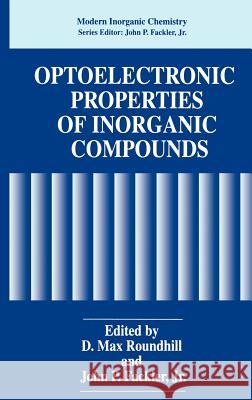Optoelectronic Properties of Inorganic Compounds » książka
Optoelectronic Properties of Inorganic Compounds
ISBN-13: 9780306455575 / Angielski / Twarda / 1999 / 412 str.
This book is intended to offer the reader a snapshot of the field of optoelectronic materials from the viewpoint of inorganic chemists. The field of inorganic chemistry is transforming from one focused on the synthesis of compounds having interesting coordination numbers, structures, and stereochemistries, to one focused on preparing compounds that have potentially useful practical applica- tions. Two such applications are in the area of optics and electronics. These are fields where the use of inorganic materials has a long history. As the field of microelectronics develops the demands on the performance of such materials increases, and it becomes necessary to discover compounds that will meet these demands. The field of optoelectronics represents a merging of the two disciplines. Its emergence is a natural one because many of the applications involve both of these properties, and also because the electronic structure of a metal compound that confers novel optical properties is often one that also influences its electron transfer and conductivity characteristics. Two of the more important growth areas that have led to these developments are communications and medicine. Within the communications field there is the microelectronics that is involved in information storage and transmittal, some of which will be transferred into the optical regime. Within the medical field there are chemical probes that transmit analytical information from an in vivo environment. This information needs to be readily accessible from an external site, and then quickly converted into images or data that yield accurate and inexpensive diagnoses.











